Items
topic_interest is exactly
virtual learning
-
2020-08-11
Long-Distance Learning
The American response to the global COVID-19 Pandemic was multi-faceted. However, of specific importance to the nation were the changes made to public education. As the Pandemic resulted in the closure of businesses, teachers and students were required to continue their educational programs online from the privacy of their homes. Although the effects of distance learning will continue to be seen, virtual learning severely limited the ability of students and teachers to use sensory perception as a tool for learning and instruction. First, distance learning no longer enabled American teachers to utilize the sensory perception of “proximity.” Throughout public education “proximity” is used to encourage student engagement with both instruction and content. Many teachers will walk their classrooms during student activities and use sensory perception to sensorially inform students that they are near to them and are assessing their engagement. Teachers use this strategy as a reinforcement tool to develop students’ ability to stay on task. Yet, during the COVID-19 Pandemic, social distancing policies made “proximity” not only impossible, but also illegal, limiting to what extent teachers could use sensory perception to foster engagement and learning. Second, not only were educators no longer allowed to use the sensory perception tool of physical proximity, but also many educators were forced to rely solely on the sensory perception of sound. School districts throughout the state of California, for example, did not permit educators to require their students to verify their attendance in live video format. The result was educators and students were engaging predominantly through speaking and listening. Furthermore, being denied the sensory perception of sight, educators could not assess to what extent students were engaging with instruction and activities. In conclusion, the COVID-19 Pandemic enacted emergency response strategies which directly affected the education of Generation Z. For both students and educators, sensory perception became more limited for every student. Yet, the sciences, including social science, are built upon the empirical information a human being receives through them. Perhaps this video will serve as evidence to answer the question, “Is the right to sensory perception and scientific information included within the natural rights of life, liberty, and property?” -
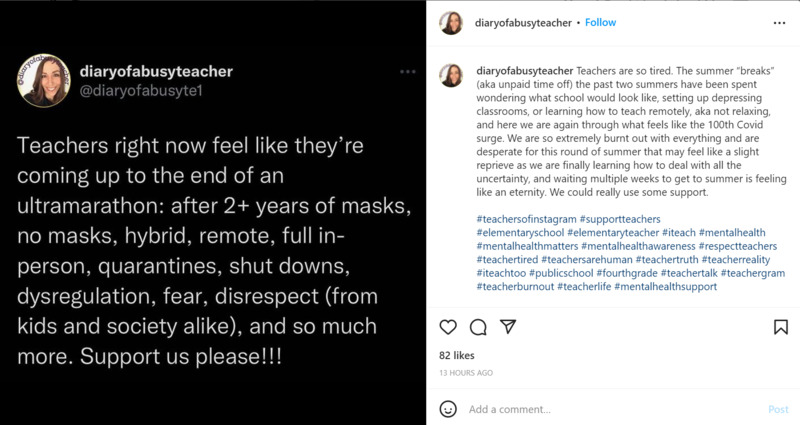 2022
2022Teachers are Tired
Now that we are ending the 2022 school year, many people have "returned to normal". Most students no longer wear masks in schools. However, we are still working through the pandemic. Teachers are still at risk for contracting COVID and are navigating the severe behavioral problems of students. With summer approaching, everyone is looking forward to a break from an extremely stressful year. -
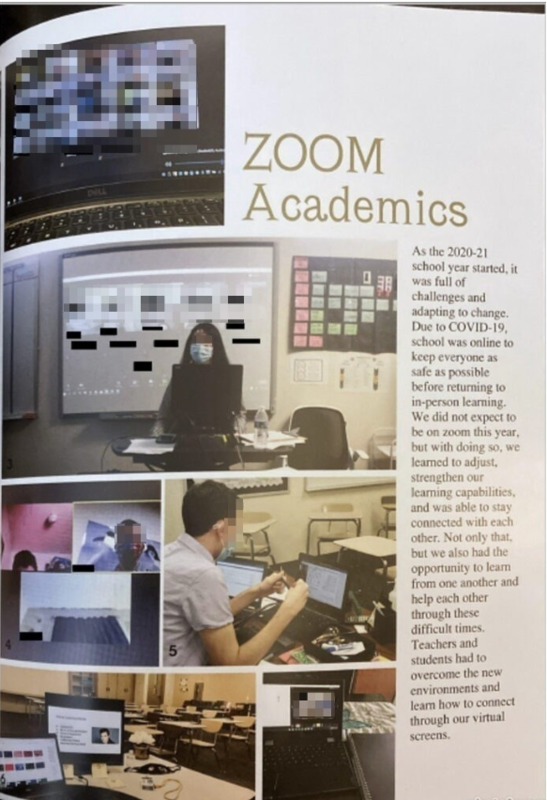 2021
2021High School Yearbook in 2021
Included is a picture of the page of a yearbook from the school that I work at for the 2021-2022 school year. This school year was very unique in that we started the year online. All classes were held virtually through Zoom from August to the end of September. At the end of September, students returned to school using a phased-in approach where one grade level at a time returned. After Winter Break, the school was held virtually again for two weeks. During the time that we were in-person, teachers were required to teach students in-person and online through Zoom at the same time. Because of that, I would have students in the classroom, and students listening to me and interacting with me through Zoom. Many students with health concerns never came to school in person. For everyone else, masks were required at all times. In addition, teachers were required to move desks in a way that students were at least three feet apart from each other shoulder-to-shoulder. This yearbook page shows different ways that teachers and students were affected during this year. The top left picture showed a Zoom screen with the students attending Zoom class. The large picture underneath shows a masked teacher standing in front of her students while also showing her students on Zoom behind her. Other pictures show teachers with their Zoom classes and empty classrooms. The text on the side was written by students who took the Yearbook class. It shows a student perspective on the pandemic and why classes were made to be held virtually for students. The 2021-2022 yearbook as a whole is an important object to me as this is the first and only school year that was affected by COVID-19 in its entirety in a way that can be seen visually. This year was unlike any other and forced me to have to change and adapt constantly. During this school year, I had to space students apart and had to make a seating chart for every class. If a student needed to move for a few minutes for any reason (like needing to charge their laptop), I would have to update the seating chart with the date to show where that student was and who they were sitting by. If a student tested positive for COVID-19, any students within three feet of them then had to stay home and learn virtually for a set amount of time. This time changed throughout the year but could be six to ten days. Looking back on these memories, I believe that it is so important to see what students and teachers went through during this time, as we are all still trying to catch up and adjust to the way that the pandemic disrupted and changed beliefs, attitudes, expectations, and ways of learning. -
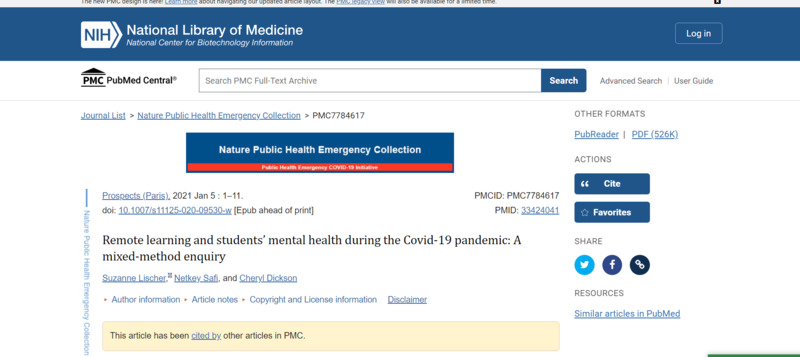 2021-01-05
2021-01-05The Covid Pandemic as a Senior in Highschool
The website that I am linking describes what happened to students all over the world in March of 2020 when all students in schools and universities had to go on lockdown and switch abruptly to complete online learning. This is an important covid-19 related topic to me because I was a senior in high school during that time, and I really struggled with my mental health, academic achievements, responsibilities, body image, and just overall my whole life. This article isn't as personal as it could get, but it gives a good historical and general idea of what student experience during the pandemic was like. -
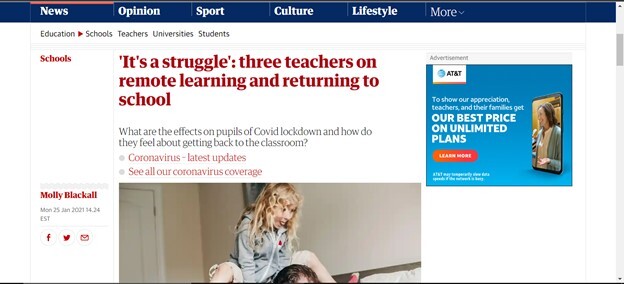 2021-01-25
2021-01-25Returning to school in a pandemic
Teachers all over the world had their entire profession change when Covid-19 struck. They had to take on more roles and wear new hats. This article shares the story of three teachers and their experience with remote learning and thoughts on returning to school. -
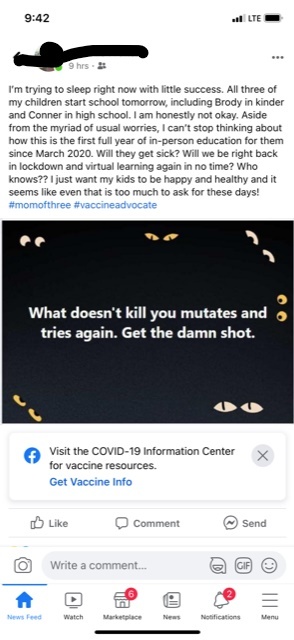 2021-08-11
2021-08-11First day of school
While many on my social media feed are in arms about tighter vaccine regulations, some realize that the pandemic is not over. As the new school year starts there are many mothers who share in my fear. Covid is still alive and well, new strains continue to form breeding in the bodies of the unvaccinated. The worse part is that this time the elderly seem much safer than our children. Our children are being sent back to school, life has returned to "normal" as the number of hospitalized children continues to rise. I share my fears with this friend who popped up on my feed this morning. Will our kids be safe? Will my daughter get infected? Will there be another lockdown? I too feel like it's become too much to ask for my kids to simply be happy and healthy because both now depend on the actions (or misactions) of others. -
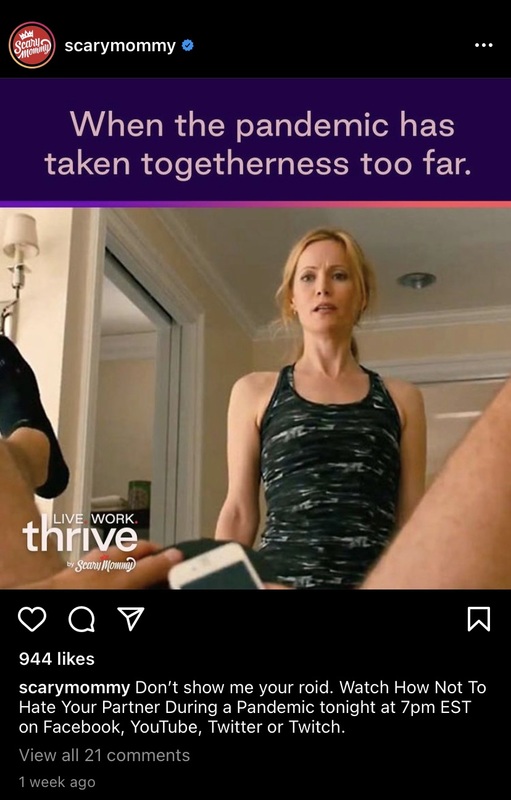 2021-02-23
2021-02-23Too Much Togetherness
They say humor is the best medicine and they weren't wrong. A lot of couples are spending a whole lot of time together recently with quarantines and social distancing orders. It was really cute at first, working side by side on laptops and having our morning coffee together. That got old real quick though. This funny take on "How to Not Hate Your Partner During a Pandemic" advises couples how to get through issues like working from home and homeschooling kids. -
 2021
2021Virtual Learning
Virtual learning hasn't been too hard but one of the major things that are a problem for me is speaking up in class. Since we are not in actual school I have not felt the need to participate as much. That is a bad thing because some of my teachers may feel like I am not paying attention even when I am. Another thing about virtual learning is that I haven’t talked to any of my classmates. The only time I talk to my classmates is when we are put in a breakout room on zoom together. One of the good things about being on virtual learning is that my grades have gone up because I have been less distracted by my classmates. -
2021-01-14
Virtual learning
Learning virtually was very strange and had many advantages and disadvantages. Every day I got on zoom from my bedroom from March 18 to about December with the exception of summer. Some advantages about it were that I didn't have to wake up as early to drive to school and that I can do school from the comfort of my room. Some disadvantages however were I couldn't hang out with my friends or talk very much, and I personally found it really hard to pay attention because each period was about an hour and 20 min on the computer and my grades weren't as good because I had a hard time not zoning out. And on top of that nearly everything was closed down from restaurants to malls and other places to hang out, exc. I prefer learning in class than virtually because I can hang out with my friends and I pay attention better in school. -
 2021-01-11
2021-01-11The Changing Sounds of Public Education During the Covid-19 Pandemic
My wife and I are both public educators at Hamburg Area High School, a rural school district in Berks County, Pennsylvania. The Covid-19 pandemic has caused our district to fluctuate between in-person and virtual instruction. During virtual days teachers have been encouraged to teach from home to mitigate the risk of exposure to the virus. I conduct my American History classes from the office in our home, while my wife, a music teacher, performs virtual music lessons with her students in our dining room. This shift to virtual teaching from home has caused my classroom, which is usually quite traditional, to sound much different. While I attempt to educate my students on the finer points of American History, the sounds of young (and often struggling) musicians fill the air. Meanwhile, my two dogs also interject into class as they battle over toys and pillows. The Covid-19 pandemic has not only moved the location of public education, but also changed the way that education sounds. I recorded the following audio clip while my 3rd period AP US History class was studying primary source documents on the post-Civil War Reconstruction time-period (1865-1876) on Monday, January 11th. -
2020-11-10
Virtual Learning for the Parents of New Middle Schoolers
As a mother of twin 12-year-olds who started middle school during the pandemic, virtually, there are many challenges we have faced. I am working from home during the pandemic and must help them both with school work. They are both in the gifted program, which makes the curriculum that much more difficult, especially since as 6th graders this is their first year in middle school. I find that on top of working from home, I have to learn the materials my children are learning before I can help them. As a parent, I have been forced into the teaching role, and there is not much anyone can do about it. The teachers are doing all that they can but virtual learning is difficult fpr all parties involved. As a history major, I am struggling to help my daughters in pre-algebra, an eight grade math class, and worry that the virtual setup may damage their academic progress. Also, there has been a major social development delay, as this is a transitional time. -
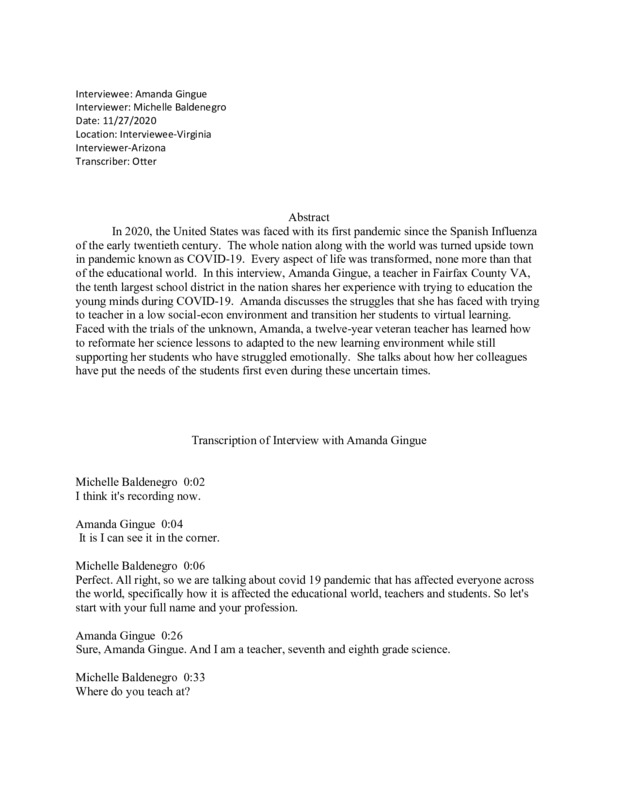 2020-12-01
2020-12-01Teaching...during a pandemic
The story is about how COVID-19 has affected the educational system. -
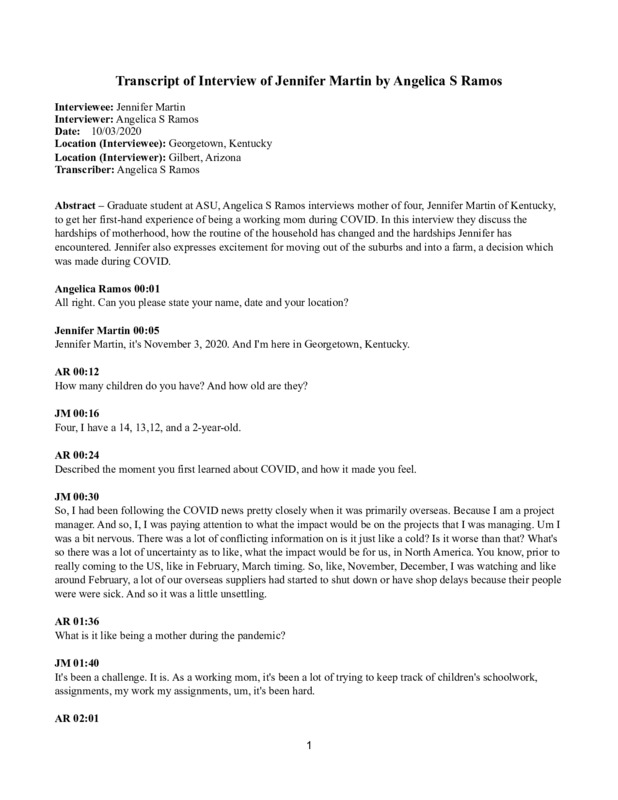 2020-10-03
2020-10-03Jennifer Martin Oral History, October 3, 2020
Graduate student at ASU, Angelica S Ramos interviews mother of four, Jennifer Martin of Kentucky, to get her first-hand experience of being a working mom during COVID. In this interview, they discuss the hardships of motherhood, how the routine of the household has changed and the hardships Jennifer has encountered. Jennifer also expresses excitement for moving out of the suburbs and into a farm, a decision which was made during COVID. -
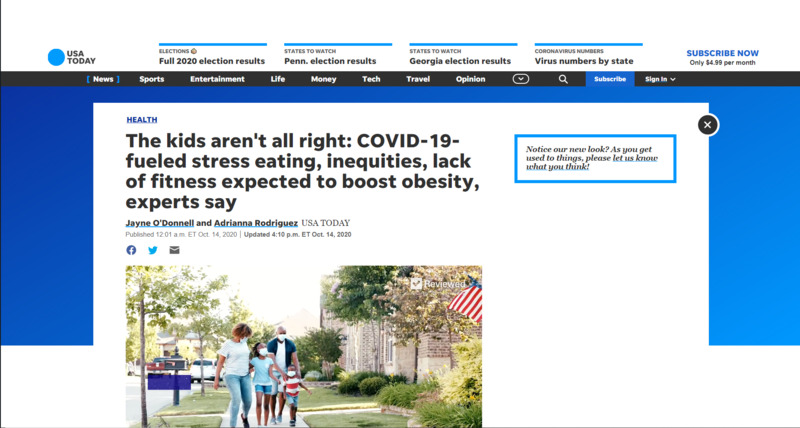 2020-10-14
2020-10-14The kids aren't all right: COVID-19-fueled stress eating, inequities, lack of fitness expected to boost obesity, experts say
Social distance and virtual learning have taken a toll on children with many turning to stress eating for comfort. Additionally, children from lower-income households are at high risk for obesity due to usually having to rely on cheaper, lower quality food. These factors, coupled with lack of exercise, had led to a small uptick in childhood obesity cases, with more expected to come, during COVID-19. -
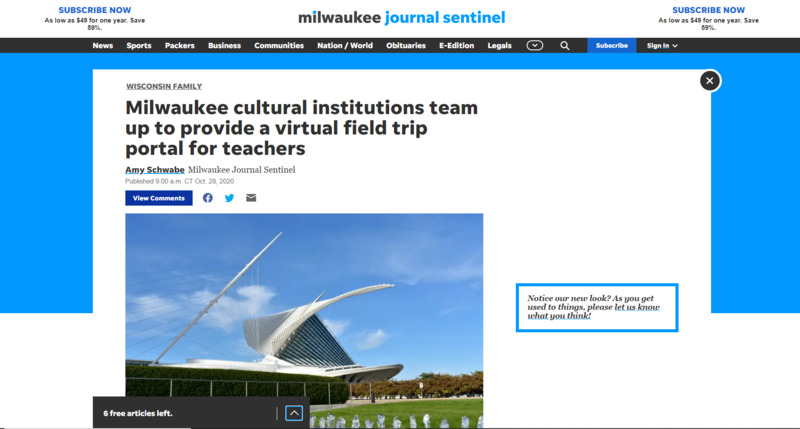 2020-10-28
2020-10-28Milwaukee cultural institutions team up to provide a virtual field trip portal for teachers
In Milwaukee, several museums and a zoo team up to create virtual field trips. This allows for students to have field trips in light of most schools not allowing off-campus trips because of COVID-19. -
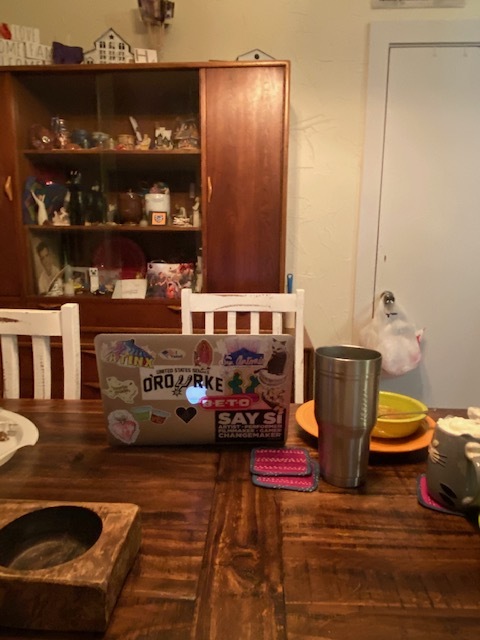 2020-10-27
2020-10-27How am I Supposed to be a Student When the World is Burning Down Around Me? A Student’s Personal Experience
I wanted to share the kitchen table's image in my family's house because it has become my workspace and classroom. I have my laptop, water, and food in the image because the virtual college has become a non-stop task. As an undergraduate student transitioning to virtual learning, I have struggled greatly. The weekdays are filled with zoom classes, discussion boards, dozens of essays, and monotonous assignments that feel like busywork. Weekdays and weekends are the same. Universities and professors have maintained high expectations for students even though we are in a pandemic, economic depression, detrimental election year, and significant social justice movement. Most days, I struggle to want to be the best student I can be when I feel less like a person. It is difficult to get out of bed, especially as hope fades every day with an increase in COVID-19 cases and deaths, people becoming jobless, homeless, and the human rights of so many people being violated. It feels insane sometimes to log on for hours when the world seems to be burning down around me. -
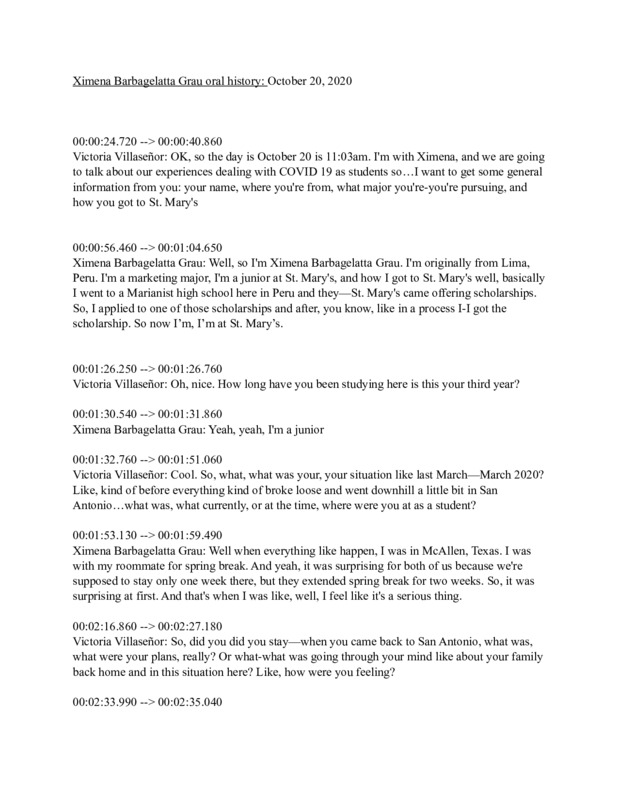 2020-10-20
2020-10-20Responding to the COVID-19 crisis as a foreign exchange student: Ximena Barbagelatta
This is an oral history with Ximena Barbagelatta conducted by Victoria Villaseñor. Ximena Barbagelatta is a foreign exchange student from Lima, Peru studying at St. Mary's University in San Antonio, TX. -
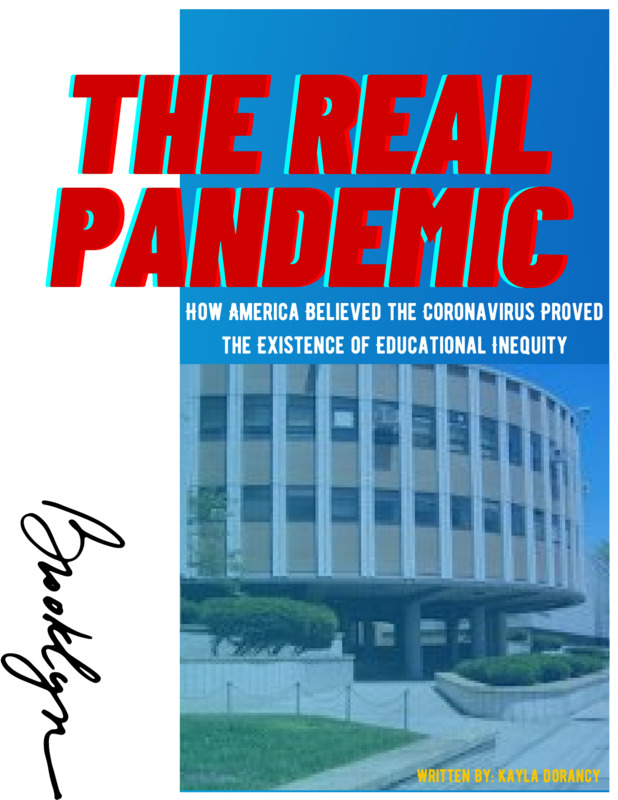 2020-03-20
2020-03-20The Real Pandemic: How America Believed the Coronavirus Proved the Existence of Educational Inequity
I am submitting an auto-ethnography on my experience as a college student in the CUNY educational system during the transition to online learning and the pandemic.
